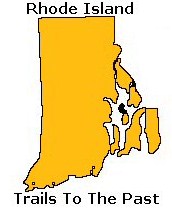|
Source:
A History of Barrington Rhode Island
Written by Thomas Williams Bicknell
Printed by Snow & Farnham, Printers 1898
"The Dorr War," as it is called, was an incident in Rhode Island history in the progress of the people towards universal, manhood suffrage. Under the Old Charter, which was the Bill of Rights of the people until 1842, suffrage was enjoyed only by freemen. A freeman, by the act of 1723, was a man who had real estate to the value of one hundred pounds, or had an annual income of forty shillings arising from real estate. The eldest son of a freeman might vote in right of his father's freehold. This law remained unchanged except in the value of the required freehold, for one hundred and twenty years, or until 1843, when the present State Constitution was adopted. Several unsuccessful attempts had been made between 1793 and 1842 to secure a State Constitution which should give larger scope to the franchise. In 1798 the freehold qualification was changed from the colonial to the decimal currency, and was fixed at $134 in value, or $7 in income from real estate.
Thomas Wilson Dorr, an educated and influential citizen of Providence, advocated, (1) The extension of the suffrage beyond landed qualifications; (2) The removal of unequal representation in the legislative body; and (3) The regulation of the power and functions of the General Assembly by constitutional limitations. Mr. Dorr and his followers urged the republican doctrine that sovereign power was vested in the whole body of the people, and claimed that under the existing Charter the rights of the people had been made subject to the minority of the land holders of the State. The largest vote ever polled by the freeholders was in the presidential election of 1840, when only 8,642 votes were cast, in a total male adult population of over 230,000. The cause of the disfranchised class was advocated with great energy and earnestness by able leaders, and associations were formed throughout the State in favor of constitutional liberty. A mass Convention was held in Providence, on April 18, 1841, to discuss the great question at issue, and adjourned to meet at Newport on the 5th of May following.
This Convention made an appeal to the General Assembly and the people in behalf of the rights of non-free-holders. In August, 1841, a Convention to form a Constitution was held at Providence, and after several sessions, submitted the final draft of the proposed Constitution to the people in November, to be voted on by the people for their adoption or rejection, on the 27th, 28th, and 29th of December, 1841. On the count of the ballots cast, it appeared that 13,944 had been cast in favor of the new Constitution and fifty-two against it. Of the whole number who voted, 4,960 were freeholders, qualified by state law to vote. The result of the election was announced to the people Jan. 13, 1842, by a Committee of the Convention, and among the names is that of Christopher Smith of Barrington, who then owned in part, and lived at, the General Allin place. An election was held under the new Constitution, and Thomas W. Dorr received 6,359 votes, and was declared elected Governor of the State. Nathaniel C. Smith was the Barrington representative in the Dorr Legislature. A conflict now arose between the government de facto of the Freeholders, or Algerine party, as it was called, and the Dorr party, who claimed the de jure government of the people. Events rapidly led up to the settlement of the question by an appeal to force, as each government claimed the exclusive right to the exercise of the legislative functions.
The Dorr Legislature met in May, 1842. Near the close of its sessions, Nathaniel C. Smith, the representative from Barrington, sent in his resignation, and a new election was ordered. Others resigned or were arrested. The Charter authorities organized military companies to put down the popular uprising "by force and arms." Dorr was proclaimed a traitor, and his followers were threatened with arrest for overt acts of treason against the government of the state. In Barrington, as well as throughout the state, the excitement was intense, and personal hatred was bitter between the members of the two parties. Family ties were broken by the strain of partisanship. Personal danger, more real than fancied, led many Dorrites of Barrington to secrete themselves or flee from the town. The Barrington militia, which had fallen into inaction, was revived in the manual of arms and company movements on the Green at the Congregational Meeting House. Pierre Bowen Mauran, grandson of Capt. Joseph Carlo Mauran of the Revolution, was the drill master of the company. In June, Governor Dorr's forces gathered in considerable numbers for such action as might seem advisable, while the position of the United States government in the matter rendered it probable that United States troops would be called to aid the defense of the existing state government. Martial law was declared by Governor King. "Governor Dorr" called for volunteers to meet in Gloucester. This was the signal for the gathering of the "Law and Order" troops, and on Thursday, June 23, the Fourth Regiment, consisting of two Bristol companies, one Warren company, and one Barrington company, took a steamer from Warren for Providence, to join the forces in that city. The Barrington company was made up as follows :
Barrington Volunteers, 4TH Regiment, R. I. V.
|
Emerson Humphrey, Captain
James A. Smith, Lieutenant
George W. Wightman, Ensign
P. Bowen Mauran, Drill Master
Thomas R. Allin
William H. Allin
Joseph P. Bicknell
George A. Bicknell
Joseph Brown
Nathaniel Bowen
|
John Carpenter
Benjamin F. Drown
Hiram Drown
Jeremiah S. Drown
George A. Gladding
Israel Grant
Thomas C. Heath
Albert N. Humphrey
Peter Ingraham
George R. Kinnicutt
Benjamin Martin
|
Joseph R. Martin
John Peck
Nicholas Peck
John R. Richmond
William Richmond
James Seymour
Lewis U. Smith
William H. Smith
Robert T. Smith
George R. Martin
Hezekiah Tiffany
|
The first order was issued Saturday afternoon, on Smith's Hill, at 4 o'clock, June 25, 1842, by the adjutant-general. The Bristol Artillery, Barrington Volunteers, Bristol Neck Infantry, Middletown Volunteers, and Newport Volunteers, commanded by Col. William Swan, Jr., were ordered to march to Greenville, Sunday afternoon, June 26, 1842, but in consequence of misapprehension of orders, they encamped at Fruit Hill that night. Col. William W. Brown, with the Marine Corps of Artillery and First Light Infantry, afterwards joined this detachment, and, under command of Colonel Brown, arrived at Greenville Monday afternoon. During Monday night (a very stormy and uncomfortable night) Colonel Brown was ordered to march to Chepachet where the opponents had posted themselves at "Acote's Hill" with embankments and artillery. By daylight, on Tuesday morning, as in the words of the orders (No. 38), "The movements of this command will be made with precaution, and an attack will not be made upon the insurgents should they be in too great force to be subdued without reinforcements, which will be immediately sent for, if required."
|
Col. William W. Brown of the First Light Infantry Co.,was in command of the force at Greenville consisting of the
Bristol Artillery, Lieut. Col. William R. Taylor . ....................84
Providence Marine Artillery, Lieut. Col. G. C. Nightingale .....79
First Light Infantry Co., 2d Reg., Lieut. F. Barber .................. 63
Newport Volunteers, Colonel Swan, 1st Regt. ........................ 76
Middletown Volunteers, Capt. N. Greene..................................... 48
Barrington Volunteers, Capt. Emerson Humphrey ................ 32
Jamestown Volunteers, Capt. G. Knowles.................................... 15
Total............................. ..... 497
|
The movement on Acote's Hill, on Tuesday, the utter rout of Dorr and his forces, the return of the victorious militia to Providence, and the return of the Barrington Volunteers to their homes on Wednesday, June 29, after a week's campaign, to tell of the "Battle of Acote's Hill" were the final scenes in the first serious attempt to create a constitutional government of the people of Rhode Island.
The information
on Trails to the Past © Copyright
may be used in personal family history research, with source citation. The pages in entirety may not be duplicated for publication in any fashion without the permission of the owner. Commercial use of any material on this site is not permitted. Please respect the wishes of those who have contributed their time and efforts to make this free site possible.~Thank you
|


